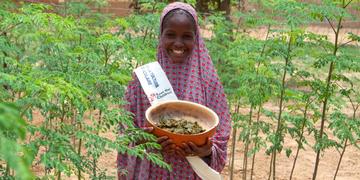
Hunger and Livelihoods
Hunger impacts one out of every nine people on earth and one in four of the world’s children are stunted due to malnutrition. To address this 91²Ö¿â provides food assistance to families following a natural disaster or emergency; builds household and community resilience to economic shocks and stresses; strengthens socio-economic conditions to improve standard of living and the ability of families to provide for their children; and provides youth with the skills and linkages they need to earn and manage a decent income. Thanks to supporters like you, we directly reached over 1.9 million individuals through our hunger and livelihoods work last year. LEARN MORE
Explore Our Hunger and Livelihoods Programs
Ìý
Global Hunger and Livelihoods Programs
91²Ö¿â’s research suggests that income shortages in poorer households, when combined with shocks such as natural disasters or conflict, reinforce poor health and nutrition and thereby lead to higher rates of child deaths.
Hunger also keeps children out of school and limits their ability to concentrate once in school. Studies conducted by 91²Ö¿â indicate that learning achievement among children from poor families is systemically lower than their peers.
An increasing number of young people live in a state of poverty, unemployment and/or underemployment. Over one-fourth of young people in the world cannot find a job paying more than $1.25 per day, the international threshold of extreme poverty. Three quarters of young workers ages 15-29 are employed in the informal sector, increasing the possibility of exploitative or hazardous working conditions.
91²Ö¿â’s Household Economy Approach (HEA) outcome analyses have found that the cycle of vulnerability due to chronic hunger and a lack of livelihoods security may lead poorer households and children to pursue unsustainable and dangerous livelihoods opportunities, to withdraw children from school, or to encourage early child marriage or harmful child labor.
Food security, livelihoods protection and strengthening, and poverty alleviation programs are an essential underpinning to ensuring the survival, education and protection of children, such that the intergenerational cycle of poverty can be broken.
To address this, 91²Ö¿â:
- Provides food assistance to families following a natural disaster or emergency.
- Builds household and community resilience to food security and economic shocks and stresses.
- Strengthens socio-economic conditions to improve standards of living and the ability of families to provide for their children.
- Provides youth with the skills and linkages they need to earn and manage a decent income.



